
Ever since I got into screenwriting, I’ve been hearing the same pieces of advice over and over again. Normally, when advice is repeated frequently, and by lots of people, it means there’s something to it. I know, as a tennis player, that the advice, “Watch the ball,” is just as relevant today as it was when it was first given, back in the 60s.
With that said, there are definitely some tennis tips from that era that are no longer applicable today. For example, it used to be that when you wanted to hit your forehand, you would step in with your left foot, turn your body, and swing forward via a “closed” stance. These days, pros will tell you to actually step sideways with your right foot, as it helps create more of a “coil” effect while swinging, which adds power.

This got me thinking I should reconsider all that classic screenwriting advice that’s been given over the years and decide how relevant it is in 2022. I suspect some of you are going to get triggered by my thoughts, as you sometimes do whenever I talk about these topics. Feel free to let your She-Hulk-sized rage out in the comments.
ADVICE: “The best way to be a good writer is to experience life.”
THOUGHTS: I’ve always had trouble with this advice because it’s vague and, therefore, not actionable. Going back to our tennis analogies, it would be like if I said, “Focus on being more present during the point.” Sure, that helps. But there’s no actionable advice there. I will say this. One of the main problems I see in the screenplays I read – both amateur and pro – is a lack of specificity. Writers write characters and scenes and plot points that they’ve seen before in other movies. Instead of writing original stuff. The way that you write original stuff is to base your scripts and your stories on your real-life experiences. If you lived in Morocco for a year, you can write a story about a unique place with a level of specificity that very few writers can. This is how Alex Garland broke onto the scene. He wrote a novel called “The Beach,” that was based on his own experiences traveling through Thailand. Could he have written as good of a book had he never been to Thailand? Probably not. The more you’re drawing from your own personal experiences, the more original your stuff is going to be. And the more life you live, the more of those experiences you’re going to have.
RATING: 9 out of 10
ADVICE: “Keep your script under 120 pages.”
THOUGHTS: My initial reaction to this advice is yes. And, actually, you should probably keep your script under 110 pages. The main reason for this is to keep the read under a certain amount of time. Readers have a set block of time allotted for script reads. Somewhere between 90-120 minutes. When you force them to go over that allotted time, they get very angry. Which is why a lot of readers will go into a script furious if they see the page count is over 120. With that said, screenwriting is a strange beast. I’ve read plenty of scripts that have been over 120 pages and have read quickly. And I’ve read plenty of scripts that were 90 pages that took forever. That’s because the type of writing tends to have a bigger effect on how long the read is than the actual page number. If someone writes in long chunky paragraphs and a lot of their script lacks clarity, forcing the reader to stop and re-read sections, those are the scripts that take 2 and a half hours to read. But if someone writes 2-line paragraphs and is a great storyteller, a 90 minute read can feel like half an hour. The truth is there’s a psychological component to that number (120) that readers just don’t want to see north of. Do so at your own risk.
RATING: 8 out of 10
ADVICE: “Concept is king.”
THOUGHTS: Whenever I hear this advice, my initial reaction is, YES! 10 OUT OF 10 YES! But like all advice, the devil is in the details. A big sexy high concept (High Concept Showdown coming in December!) does so many good things for you, the biggest of which is it’ll get you a lot more reads than a small concept. The more people who read something, the more bites you get at the apple. But I must admit, the main way screenwriters get recognized in 2022 is through the Black List. And the Black List has just as many average concepts as it does good ones. So how important can concept be? I thought about this for a while and I think I know the answer. Even though there are a lot of scripts on the Black List that don’t have sexy concepts, they still fit into the boxes that the Black List likes checked. If there’s something trendy, like socio-political horror in 2019, you don’t have to have a great concept. That script is going to get read because it’s on-trend. We know the Black List loves biopics. We know they like LBGTQ stories. Which is a long way of saying that these writers aren’t just writing whatever low-concept inspires them. They’re still being calculated with the concepts they’re choosing. Which means that concept is still king.
RATING: 8 out of 10
REMINDER!!!
What: AMATEUR SHOWDOWN – HIGH CONCEPT EDITION
When: Entries due December 1 by 8pm Pacific Time
How: E-mail me your title, genre, logline, any extra pitch you want to make about why your script deserves a shot, and, of course, a PDF of the screenplay.
Where: carsonreeves3@gmail.com
Anything else?: You can start sending in your scripts right now!
ADVICE: “You have to move to Hollywood if you want to succeed as a screenwriter.”
THOUGHTS: If you dropped this bomb in a screenwriting message board in 2003, you would come back the next day and find at least a dozen commenters banned. This advice used to get so many people riled up. And it’s understandable why. If you didn’t live in Hollywood and somebody told you that the only way to make it was to live in Hollywood, you’re going to fire some shots. The good news is that, with the evolution of the internet, the digital screenplay, and, most recently, Covid, you don’t need to live in Hollywood anymore to make it. I know people here in LA who would rather jump on Zoom than meet in person. That’s how used to virtual meetings people have gotten. With that said, if you want to be a TV writer, it’s still highly advantageous to live here. Because they want people who are going to be in a physical writer’s room together. And even if you’re a features writer, it helps to be able to meet people in person. You make more of an impression that way. Not to mention, continued real-life contact develops stronger relationships that are more likely to lead to working relationships. So, yes, it’s still preferable that you live here. But it’s by no means required.
RATING: 6 out of 10
ADVICE: “Every screenplay should have three acts.”
THOUGHTS: There was a time, back in the destructive 90s, when vagabond writer-directors like Quentin Tarantino were turning screenplay structure upside-down. Stories were being told out of order. Scenes would go on forever. Conflict, not structure, seemed to be the name of the game. Anyone writing in three acts, at the time, was considered lame. But it was interesting what happened after that. You had a bunch of writers who came into the craft writing without rules and movies quickly devolved into giant messes. It turned out not everyone was as talented as Quentin Tarantino. All the 3-Act structure does is give you 25 pages of set-up, 50 pages of conflict, and 25 pages of resolution. Do you have to use it all the time? No. But you’re going to use it in 95% of the screenplays you write. So it’s something you want to learn and you want to depend on.
RATING: 8 out of 10
ADVICE: “Outline, outline, outline.”
THOUGHTS: I don’t know why outlining is so controversial but it is. If I had to guess, I’d say that the people who don’t outline get really mad when you tell them they should outline. The implication is that they’re skipping a step and it’s making their screenplays worse. So they feel like they have to intensely defend their point. But in speaking with several newbie screenwriters over the past month, I learned something. Cause I told them they should be outlining and they came back with… “How?” My response was, “What do you mean, how? You should outline so that you have a sense of where your story is going and you don’t run out of story midway through the script.” Still, they looked back at me blankly. After some back-and-forth, I realized that a lot of beginners aren’t even confident in their understanding of the three act structure. If you don’t even know that yet, coming up with a well-structured outline is next to impossible. What this taught me was that you need to write a few screenplays and get a feel for the pacing and the structure before you can effectively start drawing up outlines. Maybe you’re one of the lucky people who have an intrinsic understanding of structure and, therefore, will decide you’ll never need to outline. That’s fine too. But I still think that, for most screenwriters, outlining helps more than it hurts.
RATING: 7 out of 10
ADVICE: “Nobody knows anything.”
THOUGHTS: Everybody loves quoting this line, even me. But I’ve found this line to be more dangerous to screenwriters than helpful. That’s because a lot of writers use it as an excuse to throw the rules away. “I don’t have to make my hero likable. NOBODY KNOWS ANYTHING!” The reality is, people know a lot of things. Those folks on the top of the Hollywood food chain? They know a sh#t-load about writing and making movies. If you’re going to get where they are, you have to learn what they’ve learned and incorporate those lessons into your scripts. It’s doubtful you can succeed by ignoring everything and writing whatever random thoughts accumulate in your head when you’re in the midst of a writing session. Become someone who knows something and you’ll have a much better shot at success.
RATING: 4 out of 10
ADVICE: “Writing is rewriting.”
THOUGHTS: If I’m being honest, I don’t know why rewriting is so heavily depended upon in the craft of screenwriting. Rumors are that there were 100 drafts of Good Will Hunting. The Safdie Brothers said they wrote 200 drafts of Uncut Gems. My issue with those numbers is that I’m not sure it’s the best use of your time – endlessly rewriting one script. I do think rewriting is important. But the truth is, if you do the work ahead of time (do a very detailed outline of your story), you won’t have to do as much rewriting on the back end. The question is, how many drafts of a script should you write? That’s impossible to answer because each writer is different, each script is different, and each rewrite is different. Is your first draft a complete miscalculation? If so, that script will have to be rewritten more than one where you got pretty close to your original vision on the first go-around. I think ten drafts should be the ceiling for an advanced writer. 15 drafts for an intermediate. And 20+ for newbie writers. Keep in mind, that’s what Ben Affleck and Matt Damon were when they wrote Good Will Hunting. They were newbies. So they needed more drafts to figure it out. But what you definitely don’t want is the forever rewrite. Get the script as good as you can make it and then move on to the next one.
RATING: 7 out of 10
$150 OFF A SCRIPTSHADOW SCREENPLAY CONSULTATION! – To the first person who e-mails me at carsonreeves1@gmail.com with the subject line: “150.” I have a 4 page notes package or a more detailed 8 page option designed to both fix your script and improve your writing. I also give feedback on loglines (just $25!), outlines, synopses, first acts, or any aspect of screenwriting you need help with. This includes Zoom calls discussing anything from talking through your script to getting advice on how to break into the industry. If you’re interested, e-mail me at carsonreeves1@gmail.com and let’s set something up!
Eighth Grade meets Little Miss Sunshine meets Euphoria in today’s screenplay!
Genre: Comedy
Premise: After witnessing a drug deal gone wrong, thirteen-year-old (and exceptionally awkward) Beatrice accidentally finds herself in the middle of an underground drug ring…and on the perfect route to having a proper hot girl summer.
About: Michelle Askew was born in Staten Island and graduated from USC’s screenwriting program. She’s currently repped at UTA. This is her first big script, which landed on last year’s Black List.
Writer: Michelle Askew
Details: 105 pages
 This is the first image that popped up when I googled, “Hot Girl Summer.”
This is the first image that popped up when I googled, “Hot Girl Summer.”
I don’t know what a hot girl summer is.
I’ve heard of it before. But I have never gone so far as to ask someone what it means. I know what the Summer of George is. Lana Del Ray taught me what summertime sadness was. My buddy, Shakey, introduced me to midsummer nights.
But I do not know what a hot girl summer is.
I assumed it meant something sexual, which is why I’ve always been confused by this logline. The main character’s age didn’t seem to fit the title.
I finally decided to read the script and figure out, once and for all, what a “hot girl summer” was, so that I could, in turn, teach all of you what it was. I never want a Scriptshadow reader to be caught in a position of ignorance should someone mention they’re in the midst of a hot girl summer. I want them to be able to respond, “God speed to you and your hot girl summer activities, of which I am familiar with.”
Our main character is a 13 year old girl named Beatrice. Beatrice has a little extra weight on her. Which is ruining the game she’s running on the boys. To put it nicely, no dudes are interested in Beatrice.
Beatrice, however, is very interested in Ben, the hot high school life guard. Ben is the Chris Hemsworth of Staten Island and yet, for some reason, call it blind ignorance, Beatrice thinks she has a shot with him. Since she’s not going to be able to depend on her looks, she comes up with another plan.
DRUGS.
Beatrice knows this slimy 28 year old guy, Ray. If she can score some weed from him, it might just give her that “cool” glow she needs to make Ben notice her. When she makes her proposition to Ray, he laughs at her. But then he gets an idea. Cops would never suspect that a 13 year old girl would deal drugs, so what if he uses her as a mule?
Soon, Beatrice is transporting “pixie” (a cool new drug) around New York. And, wouldn’t you know it, Ben finds out. He approaches Beatrice and asks her if he can score some of that pixie. Ecstatic, she says sure. Come to my party this weekend, he says. And just like that, Beatrice’s dreams are about to come true.
Except that when you’re only 13 years old and dealing drugs and trying to date guys 5 years older than you and you’re not exactly a looker… well, let’s just say those stories don’t end well. And this one doesn’t either. When the fallout arrives, it will be up to Beatrice to mitigate the damage as much as possible – damage that could follow her for the rest of her life.
To answer the question I posed at the beginning of this review, it appears that a hot girl summer is any summer where a girl decides to do whatever she wants. Although anecdotal evidence was weak, it appears that you don’t have to actually be hot to experience a hot girl summer. I think that the summer itself is the hot part. So, in retrospect, it probably should’ve been called Hot Summer… Girl… Adventure?
Anyway…
Like any good comedy, Hot Girl Summer injects a healthy dose of irony into the concept.
A 13 year old should not be worried about partying and scoring drugs and having sex. That’s where all the laughs come from. This protagonist is way too young to be in all of the scenarios she finds herself in. And that ‘fish out of water’ element is what makes it so funny.
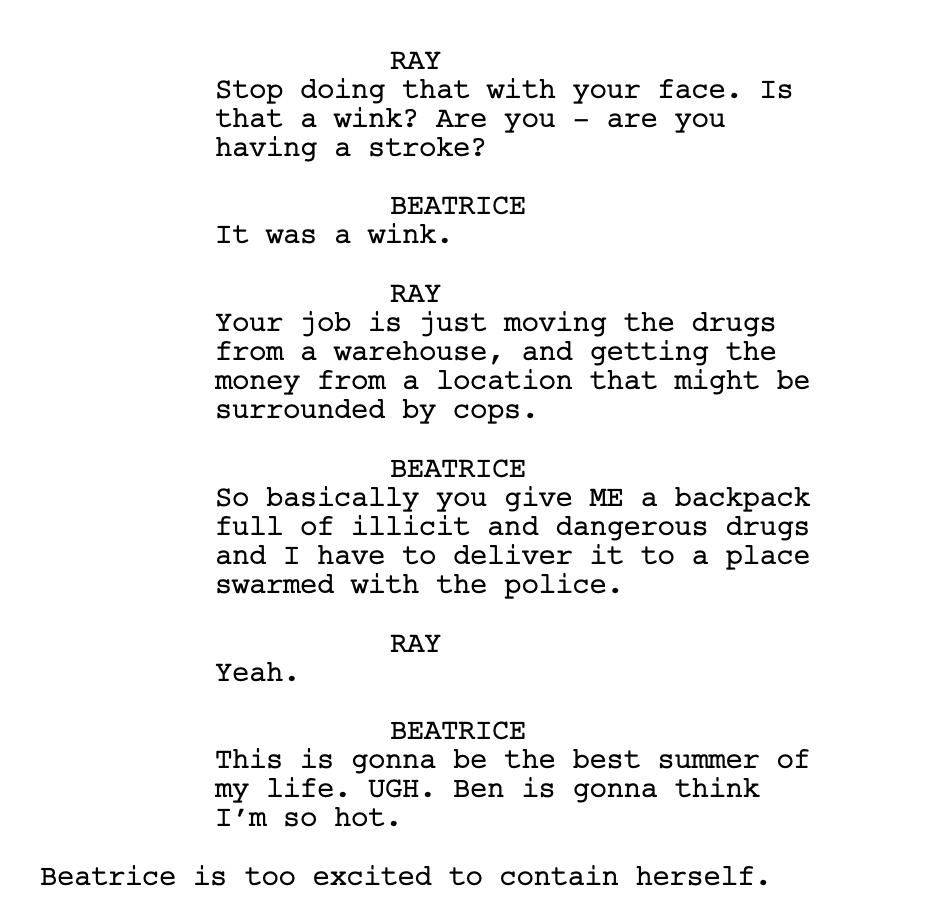
I think I learned a new screenwriting lesson today. Which is that there’s something extra-likable about a character who has no reason to be big and bold and open and active, but yet who is all of those things. It’s the exact same thing that made Little Miss Sunshine work. That girl was not a looker. She had no business thinking she should be winning beauty contests. Yet she was unfazed and charged forward optimistically.
We like this because most people are the opposite. If they have even the slightest reason to doubt themselves, they curl up in a ball and stay hidden from the world. It’s inspiring when someone doesn’t follow that path.
I also enjoy non-traditional role model relationships in movies. Ray, the 28 year old drug dealer, acts as a surrogate father to Beatrice in the movie. 100% we should not be rooting for any drug dealer who’s sending a girl into the heart of New York City by herself to deal drugs. And yet we do.
Part of the reason we do is because the writer isn’t writing what they’re supposed to write. They’re not writing Ray as this big bad terrible villain. They’re writing him with more subtlety and it creates a much more complex and interesting relationship. It reminded me a lot of the screenplay, “Bad Words,” which also leaned into the negative role model.
This is probably the funniest comedy I’ve read all year. And that comes down to the writer being naturally funny. I always tell writers who are thinking of writing a comedy – MAKE SURE YOU’RE FUNNY. People who are not your friends or family need to have told you you’re funny. Whenever you write something comedic, people need to be telling you it was hilarious. Because comedy is the one thing in all of writing you can’t learn. As much as I love Leonardo DiCaprio, he’s never going to star in a comedy cause he doesn’t have the comedy gene in him.
Michelle Askew definitely has that gene:

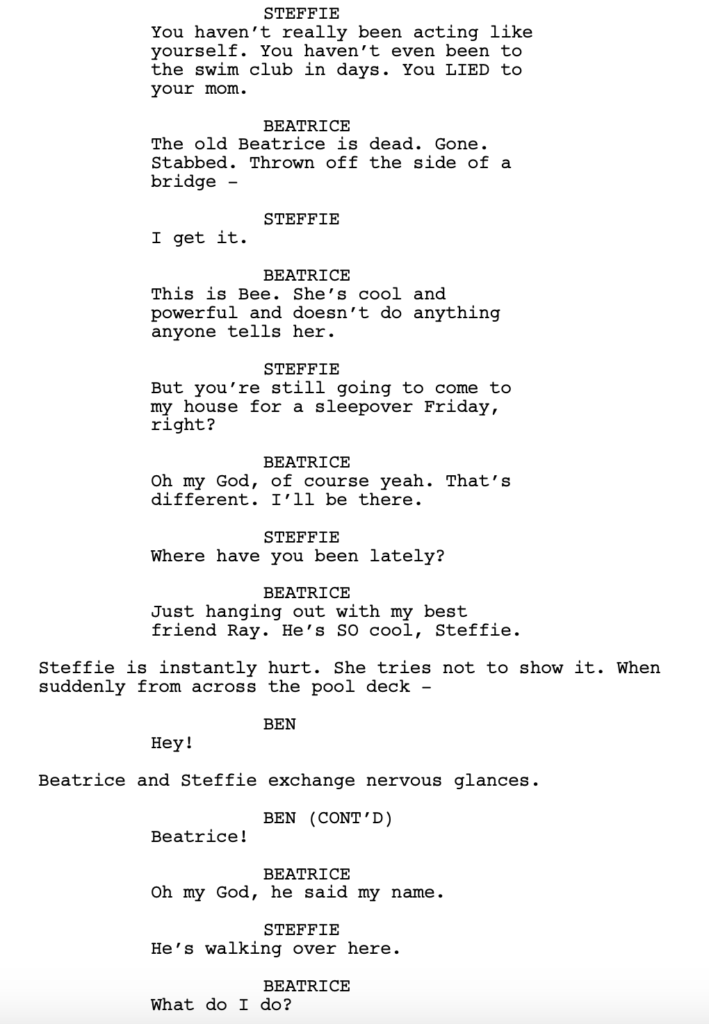
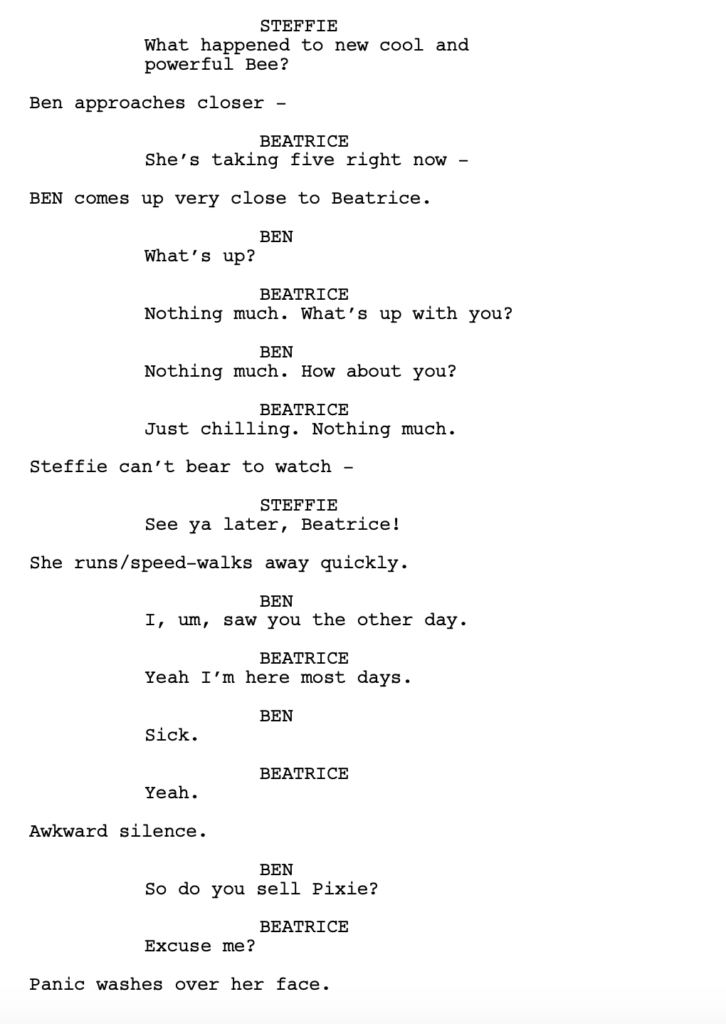
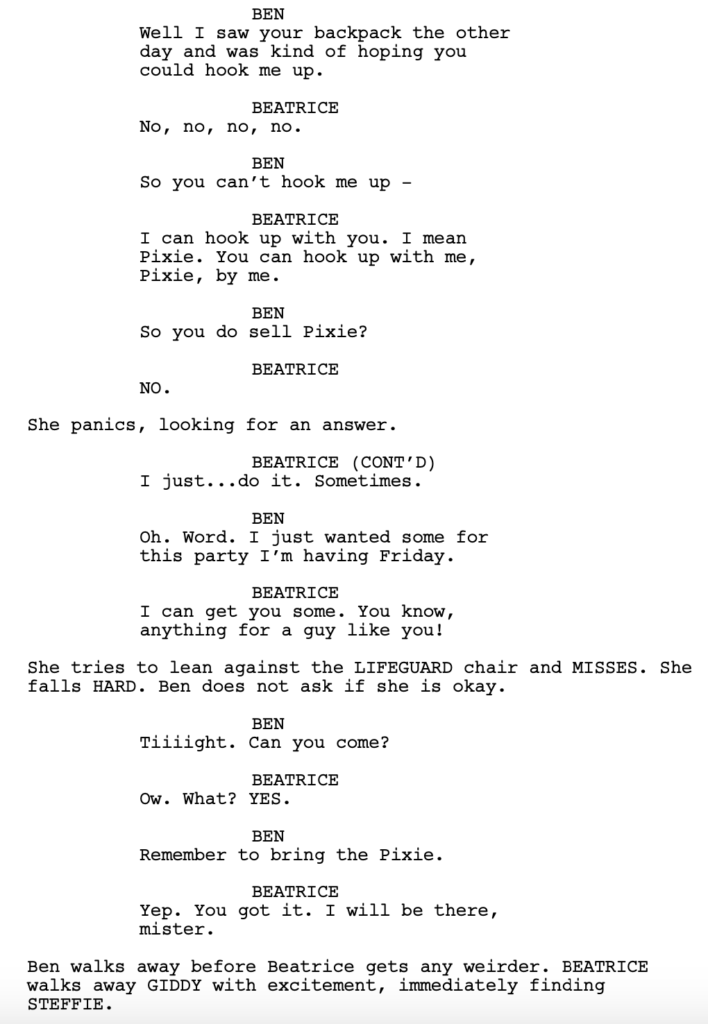
This is a really fun script. Fun main character. Well-executed plot. Never slowed down. If you want to be a professional screenwriter, this is how you do it!
[ ] What the hell did I just read?
[ ] wasn’t for me
[xx] worth the read
[ ] impressive
[ ] genius
What I learned: When describing a scene, lean heavily into sights and sounds. Play to the senses. The more specific you can be, the better. Here’s a description of the pool club early in the script: “The pool club oozes with screaming children and mothers with wine coolers in their hands, wearing oversized FDNY t-shirts and slides.” “Screaming children” – sound. “Mothers with wine coolers in their hands” – sight. “Oversized FDNY t-shirts” – sight.
House of the Dragon comes out swinging, putting the pressure on its swords and sandals fantasy rival, Lord of the Rings, to come correct!
Genre: TV – One Hour (Fantasy)
Premise: Tensions are high in the House of the Dragon, where the king awaits the birth of a new heir. But a series of unfortunate events force him into a contingency plan.
About: Does this show need any introduction? The Targaryen’s are back! Long live Westeros! Okay, I don’t know what either of those things mean but I’m trying to be a Game of Thrones fan here so give me a break!
Showrunners: Ryan Condal and Miguel Sapochnik
Writer of this episode: Ryan Condal
Details: 66 minutes

I remember all the way back to the Done Deal Screenwriting Message Board days when Ryan Condal (the showrunner for House of the Dragon) used to post on the site.
I didn’t know, at the time, that he was considered one of the more knowledgeable posters. I just remember coming across a response he made to another poster’s screenwriting question and thinking, “Whoa. This guy is on another level.”
I don’t even remember what the question was. I just remember how detailed and knowledgeable and assured his reply was. It was clear that he understood screenwriting at a level far beyond anyone else on the site.
So I’m not surprised that he’s made it this far, leading one of the biggest TV shows in history.
A show I wasn’t sure I was going to watch, by the way! I made it through about three seasons of Game of Thrones before there were more storylines I wasn’t interested in than there were storylines I was. It wasn’t like I quit via some declarative feet-stomping tirade. I just was never motivated enough to go back and watch again.
The fresh start that is House of the Dragon allowed me to come back to Westeros without having to worry about if I’d remember everything.
If you didn’t see it, the pilot follows a king named Viserys Targaryen. Viserys is under a lot of pressure to deliver a heir to his throne. Right now, all the family’s got are his young daughter, Rhaenyra, and his brother, Daemon. Due to her being a woman and him being crazy, neither are fit to take over the throne.
Luckily, Viserys’ wife, the Queen, is pregnant. And Viserys is convinced, due to a vivid dream, that his child will be a boy. While we wait for the birth, we engage in a jousting tournament that has Daemon cutting off horse’s legs to ensure he wins. And we have the troublemaking Rhaenyra riding around on her pet dragon.
Eventually, the Queen goes into labor (spoilers) and it’s a barn-burner of a delivery. She’s in immense pain. The baby won’t come out. It’s getting to point where a decision needs to be made. They cut the baby out manually, saving it and killing the Queen. Or they see what happens, in which case they might lose both. Viserys makes his choice, (bigger spoiler) which let’s just say doesn’t go well. This places Viserys in a precarious position. He must choose either Daemon or Rhenyra to succeed him.
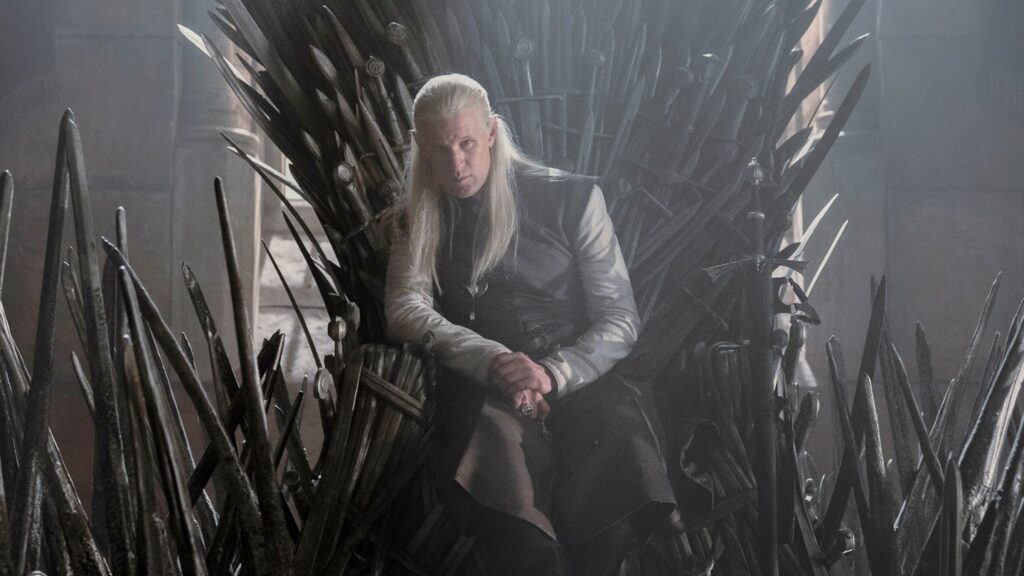 Crazy bro, Daemon
Crazy bro, Daemon
Yesterday, I talked about how sloppy the writing was in She-Hulk.
Today, you see how big of a difference good screenwriting makes.
With She-Hulk, they were basically running a scam on the audience. They’re throwing a bunch of randomness on the page and hoping that the reader does the work for them, putting all the pieces together.
Here you can tell this pilot was meticulously crafted. There was purpose to every scene. The characters were all carefully introduced. The order of things was perfectly convceived and executed. Whether you liked the finished product or not, you can’t say there was a lick of laziness in the pilot. It’s that well executed.
One of the ways I identify good writing is through the big scenes. If your big scenes are great, the smaller stuff tends to be strong as well.
House of the Dragon builds its pilot around the Queen’s labor scene. What’s important to note here is how carefully the scene was set up ahead of time. This isn’t just a, “I can’t wait to have a new kid” scene. Pillars have been propped up ahead of time to give this scene as much weight as possible.
Pillar 1: We’ve been told several times how important having a heir to the throne is.
Pillar 2: We’ve seen how important it is to Viserys that he have a son.
Pillar 3 We meet the crazy brother, Daemon, who wants to be king himself. We know Viserys having a son would take Daemon out of the picture.
In other words, the writer sets up high stakes for the labor scene so that when it arrives, we’re invested.
There was very little foresight in She-Hulk which is why it was incapable of creating a scene like this. You could see the writers hurriedly solving problems on the fly. Oh, we need to get Bruce’s blood inside Jennifer so she can become a Hulk. How do we do that? Uhhh, we could put them in a car crash. Okay, why are they in a car together? Uh, I don’t know. They’ve decided to hang out for the weekend? Okay, how does the crash happen? Ehhhh, maybe a spaceship causes it? What spaceship? Not important. We’ll just have it show up and distract her.
I mean, seriously??? This passes for professional screenwriting in 2022?? I’m embarrassed.
Meanwhile, because the labor scene was so well set up, we’re on the edge of our seats waiting to see what will happen. And the writers use one of the best bang-for-your-buck tricks in the business to climax the scene: A Sophie’s Choice. You can save your kid and lose your wife. Or you can do nothing and possibly lose both.
One of the best things you can do as a writer is place your character in a situation with high stakes and an impossible choice. Not a choice that’s weighed 55-45 in one side’s favor. A choice that’s truly 50/50. And that’s what House of the Dragon did.
That scene right there got me on for at least another three episodes. Knowing that that’s the writing bar they’re asking of themselves, I know I’m in good hands.
[Major Spoiler] Unfortunately for Viserys, things didn’t go as planned. He chose to save his baby instead of his wife. And his baby ended up dying too.
This set us up for the succession decision. Who does Viserys name as his successor? Daemon or Rhaenyra?
This was the only thing about the pilot I think they could’ve done a better job with. Unlike the labor decision, which was a true Sophie’s Choice, the succession choice was more of a 65/35 ordeal. It was clear that he was going to choose Rhaenyra. She’s smart. She’s behaved. She’s respected. What is the downside of her being chosen?
They try to float this idea that, because she’s a woman, the people will resist it. It’s unconvincing, though. Especially because we’ve been conditioned in movies and TV over the last decade to assume all female characters will kick butt. It’s a very popular choice among writers right now. So there isn’t the requisite doubt needed for us to assume anything other than Rhaenyra being chosen over Daemon.
What they probably should’ve done was make Rhaenyra more of a trouble-child. She does her own thing. She doesn’t always listen. That way, the choice would’ve been more difficult. But if you gave her those characteristics, her character starts to overlap with Daemon. He’s the troublemaker. Now you have two troublemakers? It’s lazy.
This is why screenwriting is so hard. Cause sometimes you have the solution to a problem but due to the particular makeup of your screenplay, you can’t use that solution.
What I also admire about Game of Thrones, in general, is that they’re unafraid to push storylines that make you feel uncomfortable. I think it’s important to make the reader uncomfortable at times because you want to keep them on edge! You don’t want them to feel too safe, especially in a show about fire-breathing dragons.
There’s a scene late in the pilot where the king’s weasle-y right-hand man, Otto, sees an opportunity to move up in the royal hierarchy after Viserys loses his wife. So the VERY SAME DAY AS THE WIFE’S FUNERAL, Otto sends his 15 year old daughter to Viserys and says to her, “Go make him feel comfortable. Be a shoulder for him to cry on.” The fact that this man would pimp out his own daughter to gain power is Game of Thrones in a nutshell. And I’m here for it.
House of the Dragon is another win for HBO, which continues to have the best TV writing in town. And it isn’t close.
[ ] What the hell did I just stream?
[ ] wasn’t for me
[xx] worth the stream
[ ] impressive
[ ] genius
What I learned: When you don’t have a lot of action in your story. When a lot of the entertainment comes from the drama between the characters, you should look to create a “Sophie’s Choice” every once in a while. An impossible choice attached to a high-stakes problem is one of the most compelling things an audience can watch. Just make sure that the choice is truly impossible. Don’t weight it so it’s clearly better to pick one option over the other. Then it’s just Sally’s Choice, Sophie’s weaker lamer choice-sister.
Is Kevin Feige losing a handle on the quality of the MCU?
Genre: TV Show/Superhero
Premise: (from IMDB) Jennifer Walters navigates the complicated life of a single, 30-something attorney who also happens to be a green 6-foot-7-inch superpowered Hulk.
About: This series was created by Jessica Gao, which continues a recent Marvel trend of going with riskier and riskier showrunners. Up until this point, Gao’s biggest accomplishment was writing an episode of Rick and Morty. The show has had a strange press tour, with co-stars such as Jamella Jamil openly wondering, on social media, why her costume was so ugly. The show stars Orphan Black star Tatiana Maslany as the She-Hulk. The pilot was directed by Kat Coiro, who recently directed J. Lo in Marry Me.
Writer: Jessica Gao
Details: 35 minutes
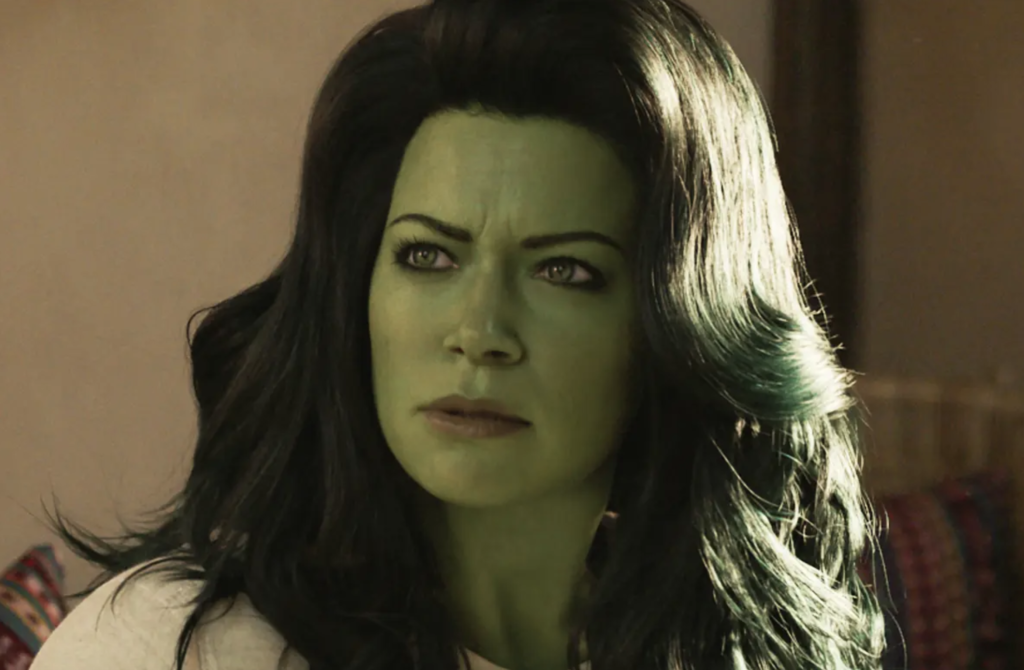
Marvel is implementing the same genius strategy Lucasfilm implemented in the 90s whereby they took their IP and laid it directly on top of already proven video game genres.
Side-scroller? Add Star Wars characters. RPG? Add Star Wars characters. First-Person Shooter? Add Star Wars characters.
Marvel realizes they can utilize this same strategy with their television shows. They have an endless number of TV genres they can lay their brand on top of. Sitcoms? Wandavision. High-school comedy? Ms. Marvel. Legal One-Hour Drama? She-Hulk.
It’s a clever strategy and I hope that, as they tighten the screws and perfect the formula, it will work for them.
Unfortunately, She-Hulk is going to be seen as one of the early test-cases that didn’t work. The reason for that is simple. It prioritizes message over story. And the thing about message-pushing TV is, even if you agree with the message, you still feel the manipulation, which breaks the suspension of disbelief, and prevents you from enjoying the experience.
We’ll get to that in a second. But first, here’s a quick breakdown of Episode 1. A young attorney named Jennifer Walters tells us (as she talks straight to the camera) that she’s an attorney but she wants to catch you up on how she got here.
This jumps us into a flashback where Jennifer is hanging out with her cousin, Bruce Banner (as in The Hulk), when they get in a car crash. During this crash, Bruce’s blood leaks onto an open wound of Jennifer’s, which means Jennifer can now turn into a Hulk too!
So Bruce whisks her away to his own private island where he spends the rest of the episode training her in the ways of Hulkness. When he explains that she’ll need to train for 10+ years before rejoining society, she freaks out and says she only needs one week. Hey, it worked for Luke Skywalker. Why not her? (note: I came up with this analogy, not the writer. The writer isn’t nearly that clever).
Her reason for *why* she only needs a week may have been the single most miscalculated line in the history of television. Which I’ll get to in a bit. But, anyway, we jump back to the present, where Jennifer is finishing up a case in the courtroom when a female villain bursts into the room, cliffhanging us until the next episode.

So I went and watched some interviews about this show and what I learned was that they originally wrote the season so the origin stuff – Jennifer becoming She-Hulk – wasn’t revealed until the final two episodes. When they test-screened it, everybody was confused. You had this big green woman walking into courtrooms without any explanation as to why.
So they hurriedly rewrote the first episode as the “origin story,” where we learn how Jennifer turned into She-Hulk.
It’s for this reason that the first episode is so problematic. It feels rushed from the start. For example, Jennifer and Bruce are driving their car in the mountains and, out of nowhere, a spaceship arrives, which distracts Jennifer enough that she crashes. This spaceship is never mentioned again. We have no idea who it was or why it was there.
The writers then make one of the classic “I’m a newbie screenwriter” mistakes where Jennifer keeps passing out as a cheap way to move her from location to location. She passes out after the crash, which allows us to jump to Bruce’s lab. She passes out again during one of Bruce’s tests, which allows us to jump to Bruce’s secret island.
People don’t routinely black out. So, when you’re doing that, the reader reels from your laziness. It feels like the writer isn’t even trying.
From there, we get the “fun and games” section where the Hulks play around with each other, tossing boulders into the atmosphere. It gets kind of fun, except that there’s this growing “men just don’t understand” subtext permeating the story. If Bruce is explaining something about being a Hulk, Jennifer sees it as “mansplaining.”
It’s mostly in a jokey way. But that’s when the show hits us with the line that’s now gone viral and which will be the nail in She-Hulk’s coffin. Because what the line says is, “This is a message show. We’re going to be propping up one gender over another. And if you don’t like that, buh-bye.” Which is their prerogative but it’s a fast way to lose half your audience. And why in the world would you want to do that?
*Ahem* 🗣 Say it louder for the people in the back 🗣 #SheHulk #TatianaMaslany pic.twitter.com/EWd57xbehr
— IMDb (@IMDb) August 18, 2022
Being this on-the-nose about ANYTHING isn’t going to work. There’s also such a generalization here from the character – painting gender with such a broad brush – that it makes her look ignorant. Which, in turn, makes us not like her.
One of my favorite movies from a couple of years ago was The Invisible Man. That movie was about the dangers of some men being toxic. And it never had a scene like this. Where the heroine spouts out on-the-nose dialogue about the state of the male gender. If ever there was an attacking line, it attacked the individual, her ex-husband. Not every person on the planet with a penis. Yet the movie gets its message across 1000x better than She-Hulk.
It’s frustrating because I like the actress here. And I like the idea of a superhero version of Ally McBeal (which is getting a sequel btw, BECAUSE of this show). But the second the show decided it wanted to be exclusive instead of inclusive, it was done. They may double-down with a series renewel out of spite for the blowback they’re getting. But mark my words, this series is toast.
Kevin Feige has to be careful because he’s starting to lose touch.
We just saw Top Gun pass Avengers Infinity War at the domestic box office. What is Top Gun known for other than being a really great movie?
ZERO MESSAGE!
All it cared about was entertaining. And audiences were like, “FINALLY! We don’t have to be preached to. For once!”
“Nope,” the biggest major release message film of the year, made 100 million less than the studio was hoping for.
They/Them is getting destroyed by the very critics who are so desperate to prop it up.
People are sick of the preaching. Yet She-Hulk is ready and willing to not only die on that hill, but become a martyr on it.
The thing is, there are ways to push messages and get the audience on your side. One way is to take the piss out of the preaching. When Jennifer says, “Men are toxic and the patriarchy is in charge and blah blah blah,” have Bruce say something like, “Okay, calm down there, Don Lemon.” Have more fun with it instead of slamming us over the head with a hammer, implying that if we don’t weep for Jennifer, we’re bad.
Unfortunately, even if this wasn’t an issue with She-Hulk, the writing isn’t strong enough to have saved it. We can see that right from the start. Jennifer turns to the camera and starts explaining things to the audience. This is fine. Breaking the 4th Wall has been done forever and is a legitimate creative option.
But then she refers to what she’s in as a “legal show.” In others, she goes beyond the fourth wall to the fifth wall. She’s not just talking directly to the audience. She’s telling you that this thing she’s a part of? She’s just an actor in it. They might as well have turned the camera to show the crew shooting the shot. That’s how little they care about creating an illusion.
It’s sloppy. It’s a cop-out. It gives them an excuse to be lazy cause now their hero can say stuff like, “Sorry for that lame scene! We didn’t have a lot of time to write it! Zoinks!”
Between that and the random spaceship and the blackouts and the over-the-top messaging – this is just a poorly written show. The only reason it seems halfway professional is because of all the money they spent on it. But from a writing perspective, it’s hackneyed and should be used as an argument to reestablish some quality control at the Marvel headquarters.
[x] What the hell did I just watch?
[ ] wasn’t for me
[ ] worth the stream
[ ] impressive
[ ] genius
What I learned: What a lot of writers don’t realize is that when you preach, you literally achieve the OPPOSITE of what you were trying to do. We see you’re trying to insert a message into our head, which makes us resist the message. Instead, sell your message through SHOWING as opposed to telling. By showing us just how psychotic and obsessed the ex-husband was in The Invisible Man, we received the deeper message about male toxicity invisibly.
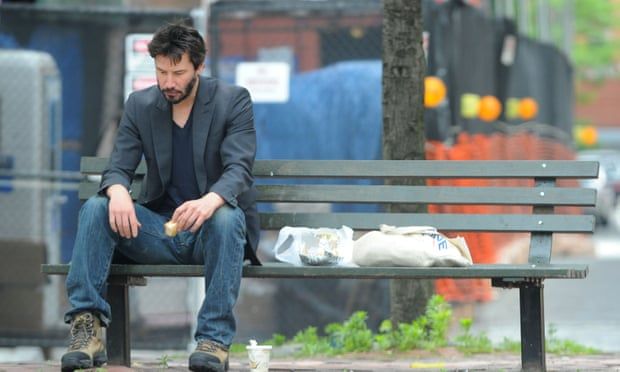
If you’re an aspiring professional writer, this question is probably a familiar one:
What if you’re just not good enough?
I’m here to tell you that this question shouldn’t scare you. It should invigorate you. Because all it means is that you’re an artist. To be an artist is to doubt yourself. It’s baked into the cake.
Of course, that doesn’t help you in the moment, when you get word that your script didn’t advance past the first round of a screenplay competition. Or you send your script to a friend for feedback and they tell you, as nicely as possible, that it blows chunks.
In those moments, it’s impossible not to wonder if you’re good enough.
Let me alleviate some of that fear right off the bat.
Almost all doubt is b.s.
If it was real, the second you achieved something, the doubt would stop. It would say to you, “I’m sorry, I was wrong. You’re definitely good enough. My bad.”
When you make the Black List for the first time, you will ask yourself, “Do I belong here?” When you sell your first script for a million dollars, you will ask yourself, “Was it a fluke?” When you get your first big studio credit, you will ask yourself, “Am I an imposter?”
I know a very famous screenwriter, someone who’s arguably in the top 10 most successful screenwriters of the last 30 years – and even he expressed to me that he thinks, “Have I lost touch?” “Do I not know what audiences want anymore?”
I tell you this so that you see doubt for what it really is – a leech that thinks it’s doing you a favor by lowering your expectations so you don’t get upset when something doesn’t go right. You’re an artist. Therefore, you will always doubt yourself on some level and THAT’S OKAY.
What’s not okay is allowing the doubt to control you. Writers, by and large, are introverts. They live in their heads. This is extremely dangerous when things aren’t going well because the writer will start asking the question, “Am I good enough?” And it will loop. “Am I good enough?” “Am I good enough?” “Am I good enough?”
If you don’t put a stop to that loop, perception becomes reality. You aren’t good enough because you’ve convinced yourself you aren’t good enough. And that’s when the true damage sets in. The less you believe in yourself, the less you’ll write. The less you’re writing, the less chance you’ll write the thing that catapults you to the next level.
So while the question, “What if I’m not good enough?” will always be there, it shouldn’t dictate your belief in yourself or your writing output.
I remember resisting starting Scriptshadow because I didn’t think I was a good enough writer. I’d read a million articles in newspapers and magazines and I didn’t think of myself as someone who could match that level of professionalism. I wrote in a sort of goofy informal manner, the exact opposite of what “professional” writers did, and that nearly prevented me from starting the site.
In the end, I tricked myself by labeling the site “non-professional.” If the site itself was non-professional, then I didn’t need to be professional. It did the job and in the intervening years, I learned that professionalism, while important, wasn’t the whole ball of wax. There were other factors that make you a good writer like your writing style, your sense of humor, your ability to entertain, your point-of-view. All of these things could bridge the gaps you have in your writing.
I’m embarrassed to admit that when I started the site, I did not know that you always put quotes AFTER the punctuation. But had I convinced myself that I wasn’t good enough to start the site, I never would’ve learned that and fixed it.
Probably the biggest reason this question comes up is time. When you’ve been writing for a long time and nothing’s come of it, it’s hard to identify any reasons to continue other than blind faith. And while blind faith works for the first couple of years, it seems to depreciate exponentially every year thereafter.
Every rejection seems to reinforce that you weren’t cut out for this line of work. And since most writers don’t have a support network, they eventually fall victim to the negative voice in their head telling them that their pursuit is a waste of time.
But you know what I think?
I think that’s bull$hit.
The reason being: You can always get better.
Always.
There are hundreds of little things in screenwriting you can do that, once you learn, your screenwriting gets better. So as long as you’re constantly making those little 1% improvements here and there, you’re raising your overall ability as a screenwriter.
Maybe you write twenty practice scenes where the only thing you focus on is building conflict into the scene, so that your scene-writing becomes more entertaining. If you do that, you’re going to write lots more conflict-heavy scenes in your scripts, and I guarantee it will make them more entertaining.
Or when you write your next draft, focus on losing one line from every action paragraph. That will ensure your script is more lean, and therefore, faster to read.
Do a deep dive one month where you watch your 20 favorite movie characters and write down what it is about each character that you like so much. Take that research, identify the commonalities between the characters, then start writing protagonists with those qualities into your own scripts so that your main characters are better.
I’ve got 1000 “What I Learneds” on the site. Go through them all and use them as prompts for screenwriting practice. As long as you’re always learning something new each time you write, you’re improving. Therefore, it’s only a matter of time before your writing reaches a professional level.
It’s the writers who keep making the same mistakes, the writers who don’t seek out criticism, who will stay at the same level. And, yes, if you aren’t constantly trying to improve, then you probably will never be “good enough.” The landscape is too competitive not to be improving. Luckily, improvement is within your control.
I tell writers all the time during a consult: “This is what you’re doing wrong.” I’m very clear about it because I’ve found, over the years, that if I sugarcoat it, they don’t think it’s as big of a deal as it is. So I make it clear: don’t do this anymore. Yet they come back to me with another script a year later and they’re making the exact same mistake.
For example, they’ll be very obvious and clumsy when writing exposition. So I’ll go through the exposition and explain why it’s clumsy. I’ll explain how to write it so it isn’t clumsy. And yet, when the next script shows up, I see clumsy exposition again.
I understand that we don’t always grasp concepts the first time we hear them. But for a lot of aspiring writers, there seems to be an, almost, willful ignorance about these concepts. They either don’t think they’re as big of a problem as they are or they think that they’re special somehow, and that this particular issue doesn’t apply to them.
I know writers on this site who I want to shake and scream, “YOU KEEP MAKING THIS SAME MISTAKE! YOUR WRITING WOULD BE SO MUCH BETTER IF YOU JUST CHANGED THIS ONE THING!” For some of these writers, I’ve told them this! And yet the same mistakes are still there. And it baffles me. Cause I’ve led you to water. But you still have to be the one to drink.
What I’m saying is, any question regarding whether you’re good enough or not, is usually self-inflicted. You can have the goods if you’re willing to do the work. But if you’re stubborn, if you think your way is the only way, if you’re ignorant, if you don’t think it’s as big of a deal as I do, if you don’t have an “improvement” mindset – you’re going to be stuck in that “almost-pro” tier forever.
And I already know some users will decry this and say success still comes down to those who get lucky. Look, luck plays a part in everyone’s life. But luck favors the people who are ready for the luck to strike them. It doesn’t operate randomly. If some producer is reading Scriptshadow and sees an Amateur Showdown script that they decide to read a few pages of — that producer is not going to buy the script just because. They’re going to buy it because the script is good. And the script was good because the writer did the hard work, kept improving, until their writing was at a professional level.
What I’m saying is, you are good enough.
I truly believe that.
Outside of a tiny percentage of people who don’t have any sort of knack for writing, you are good enough. But you have to be constantly improving if you’re to have any chance at success. So please, always be seeking criticism. You need to know what your weaknesses are so you can fix them. Always be improving some aspect of your writing. Always be open to there being a better way than the way you’re doing it now.
There’s no way you can’t get to the top if you’re always improving. Period. The only way you won’t get there is if you stop. And 99% of writers either stop writing or stop trying to improve. Don’t let that be you.
Happy writing this weekend!
$150 OFF A SCRIPTSHADOW SCREENPLAY CONSULTATION! – To the first person who e-mails me at carsonreeves1@gmail.com with the subject line: “150.” I have a 4 page notes package or a more detailed 8 page option designed to both fix your script and improve your writing. I also give feedback on loglines (just $25!), outlines, synopses, first acts, or any aspect of screenwriting you need help with. This includes Zoom calls discussing anything from talking through your script to getting advice on how to break into the industry. If you’re interested, e-mail me at carsonreeves1@gmail.com and let’s set something up!

